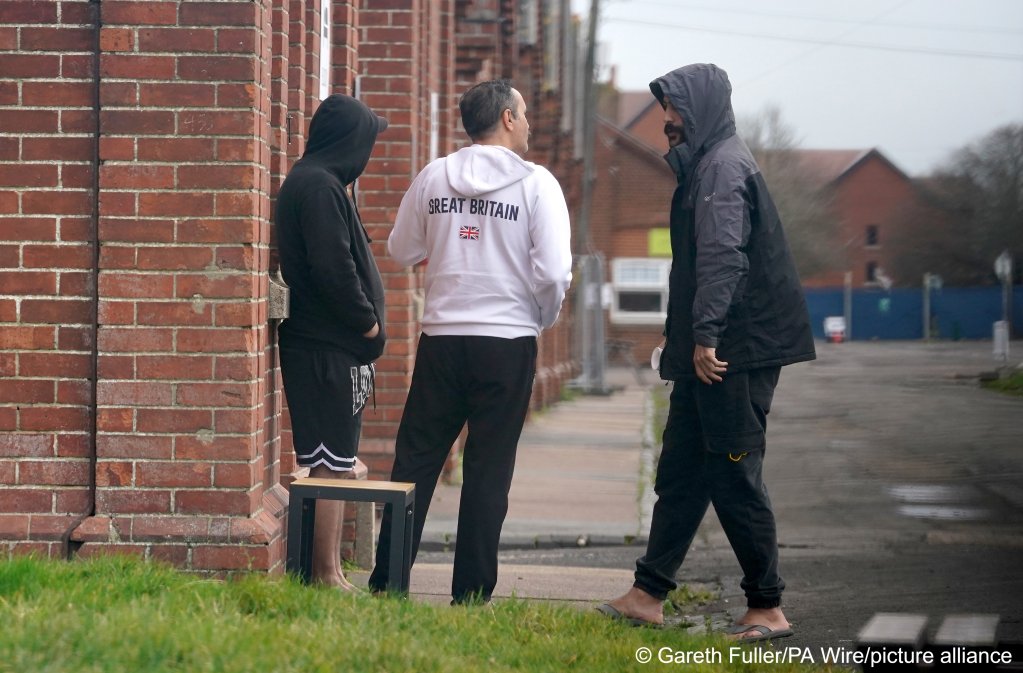Anti-migrant protests erupted in the UK in July after an asylum seeker was accused of sexual assault, intensifying anger over the government’s use of hotels for housing. In this explainer, InfoMigrants looks at how the UK accommodates asylum seekers.
Anti-migrant protests and demonstrations broke out in July when a migrant male was accused of sexual assault. The suspect, who has since been convicted, was being housed in hotel accommodations in Epping while waiting for his asylum claim to be evaluated.
The incident sparked widespread outrage and put the use of hotels to house asylum seekers under heavy criticism, fuelling sustained protests across parts of the UK.
In this explainer, InfoMigrants looks at the UK policy for housing asylum seekers and refugees and why it has become so contentious.
Read AlsoUK: Judge grants injunction to Epping council to have asylum seekers removed from hotel
How is housing and shelter determined for people seeking asylum in the UK?
If someone arrives in the UK to claim asylum but has nowhere to live or has no financial means to support themselves, under Section 98 of the Immigration and Asylum Act 1999, they can be given immediate temporary housing.
The kind of housing usually covers full-board accommodation, meaning that meals and housing are included. However, this type of accommodation is only meant to cover the shelter needs during the very first stage of the asylum process. This is the part of the process where the Home Office evaluates whether someone qualifies for longer-term support.
In general, the government principle when allocating accommodation is that it is offered on a ‘no choice basis’. This means that accommodation is intended for those who would otherwise be destitute and have no other housing option open to them, such as staying with friends or family.
Outside of the general 'no choice basis', individual needs when it comes to health and the needs of children should be considered when determining accommodation for asylum seekers.
The UK Home Office has a detailed explanation of its asylum accommodation policy here.
What types of accommodation are open to asylum seekers?
Once eligible under Section 95, asylum seekers are housed across different cities across the country. Accommodation types include private rentals, housing association units, or other contracted properties.
A short description of each type of accommodation is below.
Hotels
- Widely used as contingency accommodation when other options are scarce. Areas with noted high use of hotels for asylum seekers include London, the South East, and the East of England.
Dispersal properties or private homes and flats
Private rentals or government-sourced properties used for longer-term stays
- Hostels
Often used for emergency housing in dense areas like London or Kent
- Immigration Removal Centres (IRCs)
Facilities such as Brook House and Tinsley House are used for individuals under immigration detention during their asylum claim process
Some asylum seekers, such as those whose claims are considered “clearly unfounded,” may be held in IRCs during their claim process. These facilities process claims more quickly but often limit access to appeals.
- Processing centres
Temporary centres like the Manston arrivals and processing center are used for short-term holding-- initially intended for under 24 hours, but sometimes extended to weeks due to backlog.
- Barracks and modular sites
Sites such as Napier Barracks have been used in the past to shelter asylum seekers. Newer alternatives being explored include warehouses, modular housing, and industrial or military sites.

- Host family accommodations via charity
Independent organizations like Refugees at Home match asylum seekers with host families. The charity has reportedly made over 7,000 placements under this arrangement.
Why are hotel accommodations for asylum seekers so contentious?
Apart from the incident in Epping, which triggered ongoing anti-migrant protests, the British government has been struggling with the costs of housing asylum seekers in hotels. This is further aggravated by the continuously increasing number of irregular crossings into the UK through the English Channel despite interventions to deter such crossings.
Currently, an estimated 32,000 asylum seekers are housed in hotels. Once a backup option for asylum seekers, hotels have become central to the UK’s asylum housing framework since 2020, driven by a growing backlog of asylum claims and a shortage of long-term housing.

Traditionally, asylum seekers were placed in private rentals and spread more evenly across the UK. But since 2018, numbers have become more concentrated in London, the South East, and the East of England. These are also the regions that show the highest reliance on hotels.
According to a study by the Oxford-based Migration Observatory, hotels cost the UK about six times more than other asylum housing. The government cut average nightly rates from 162 British pounds (187 euros) in 2023 to 119 British pounds (137 euros) in 2025 by cramming in more people per hotel, but reliance on hotels remains high.
Unlike most European countries, the UK leans heavily on hotels and private contractors. Critics have slammed this strategy as unsustainable and socially divisive.
What is the government looking at as possible solutions?
With more than 100,000 asylum cases still pending, ministers are planning reforms to speed up appeals. At the same time, the government has pledged to end hotel use altogether.
The UK government is exploring the use of former military sites to reduce its costly reliance on hotels, as Channel crossings top 30,000 this year. Defense Secretary John Healey confirmed talks with the Home Office to identify both military and non-military sites for temporary housing as part of government efforts to gradually phase out hotel use.
Read AlsoUK to explore military sites for asylum seekers as number of Channel crossings continues to soar
